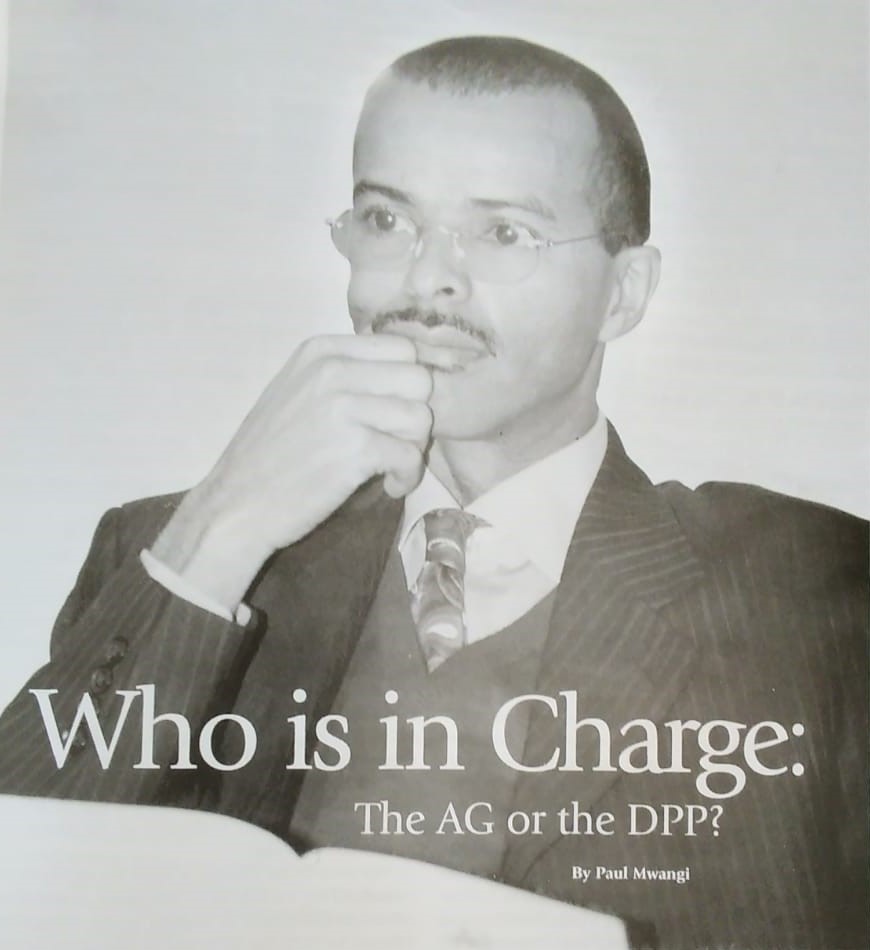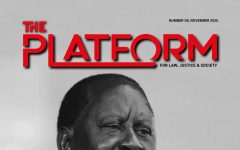For an office that attracts so much attention, the office of the Director of Public Prosecution is surprisingly irrelevant in Kenya, and illegal. Established through questionable legal provisions, the office exists today as an embarrassing indictment of our failure to pay more serious attention to our laws and our system governance. Since 1963, the office of the Attorney General has been the chief legal office in the republic. Though section 26 of the Constitution constitutes the attorney General as the principal legal adviser to the government, his more specific duties are laid out in other constitutional provisions and laws. In respect to criminal prosecutions, these are subsections 3 and 4 of section 26 and section 85 of the criminal procedure code.
Section 26 (3) and (4) of the constitution give the Attorney General four categories of power in respect to criminal prosecutions. First, he can, if he so desires, exercise the power of instituting a criminal prosecution. Secondly, he can take over a prosecution commenced by another person and conduct it himself. Thirdly, he can discontinue ay prosecution, whether begun by him or any other person. Lastly, he can order the police to investigate any person for any offence.
The constitution therefore envisages that ordinarily, others, not the attorney general, shall conduct criminal investigations and prosecutions. The law that deals with this is the Criminal Procedure Code, whose purpose is to make provision for the procedure to be followed in criminal cases. The code lays down the courts that can try criminal cases, the procedures they shall use and the persons who can prosecute those cases. Under section 85, the code gives the attorney general the powers through notice in the gazette, to appoint public prosecutors for the republic of Kenya.
The code, the Attorney General or the President?
Section 85 of the code is explicit on the authority that appoints public prosecutors. It derives this authority from section 26(5) of the constitution, which provides that the Attorney General may exercise his prosecution powers by himself or by officers subordinate to him and in accordance with his general or special instructions.
Legally, therefore, it is up to the attorney general to decide whether, or not to delegate his constitutional prosecution powers, and if so, to whom. Under the code, it is up to the attorney general to decide who becomes a public prosecutor. Without a gazette notice by the AG, no person can legally undertake a public prosecution in Kenya. And without the AGs instruction, no person can exercise powers under section 26(3) and (4).
So what is the legality of the office of the director of public prosecutions, which recently got a controversial occupant in the name of Philip Murgor? And can the president of the republic constitute the office validly? Section 24 of the constitution gives president the power to constitute and abolish any office for the republic and to make an appointment to any such office. Can this power extend to override or complement the powers of the attorney general?
There are two answers to this question. First, the president can constitute any office and appoint someone to it. This appears to be the procedure under which president Moi created the office of the DPP in 1996. He then appointed Bernard Chunga to the office.
However, under S24, the President can not empower the Director. He cannot give him any powers over prosecutions in Kenya. After appointment, the office remains a bare bureaucratic office until the attorney general decides to delegate., or to constitute the DPP as a public prosecutor. Unless he does so, the DPP cannot touch a prosecution.
But further complications come from Code. Section 2 of the Code defines a Public Prosecutor as the attorney general, the solicitor general, the deputy public prosecutor, a state counsel or a person acting under the AG’S direction. In respect of delegating his powers under the code, section 83 only recognizes the solicitor general, the deputy public prosecutor, the assistant deputy prosecutor or a state counsel.
In 1984, the then attorney general, Martin Muli, published legal notice no. 106 of 1984, by which he vested his powers under the code to the above offices, this shows that without the AGS hand, no person appointed by the president to hold any of those offices has powers to prosecute.
Section 83 also empowers the AG to revoke any of the powers he has delegated under the code. So then, what is the sense of having the president constitute the office of the Director of Public Prosecutions and appoint someone to it if that person cannot exercise any powers without delegation by the AG, and if the AG can direct him to act as the AG wishes and finally, if the AG can revoke the powers? And all the while, the AG cannot come under the direction and control of the president?
International Developments
Until 1996, the office of the DPP was unknown in Kenya. By virtue of his powers under the constitution and the Criminal Procedure Code, the Attorney General was the implied Director of Public Prosecution. Confusion, however, arose often due to the subordinate office of Deputy Public Prosecutor also abbreviated as DPP. Over the years, the subordinate office came to be mistaken for actual office and continuously assumed its powers. The action of creating the directorship in 1996 was viewed as regularization of an official position that had already taken root. But in truth, the translation of Deputy to a Directorship was illegal.
The office of the director is much too significant to be created and run the way we do it in Kenya. Historically, the office was first created in England by the Prosecution of Offences Act 1879. The Act created the office of the Director of Public Prosecutions under the Home Secretary’s office. The purpose of this act was to create an independent authority to take charge of police prosecutions so that the police force did not investigate and prosecute at the same time. In 180, Sir John Maule was appointed as the first DPP under the Act.
However, nothing much changed since the new DPP had no infrastructure under which to operate. Like the case in Kenya, he had little effective control over the numerous police prosecutions that take place daily. The dichotomy of the police as investigations and prosecutors was also not dealt with effectively.
A Royal Commission established in 1962, stated that the dichotomy had to end, as it was unacceptable. After three decades of lobbying, the British Government finally established the Crown Prosecutions Services under the Prosecution of Offences Act. The head of the service was the DPP. The developments in England influenced many other jurisdictions in the commonwealth. Australia effected the DPP Act in 1983. Other countries that followed suit were New Zealand, Scotland, Ireland and New South Wales. In 1995, Uganda created the Directorate of Public Prosecutions under a Director in the Constitution. Kenya was clearly behind. We rushed a created an illegal, badly thought out, barely conceptualized office of the DPP.
The Politics
After Uganda created a constitutional office of the DPP Kenya not only came under a lot of peer-group pressure to follow suit, but there were also strong political motives to have the office. Previously, the person in charge of the day to day supervision of criminal prosecution was the DPP. A subordinate of the AG, he generally attended to all matter under his department and only referred to the AG when need arose. The leeway that he enjoyed made him a perfect tool for the political system. He could order investigations and prosecutions, could conduct the prosecutions himself and, importantly, he had no security of tenure. He served at the pleasure of the president. In this way, the office of the DPP became that of the government ‘hatchet-man.’
After multi-party democracy became established in Kenya, attention was directed at the office of the attorney general. Every action that was taken by the government ‘hatchet-man’ brought pressure on the AG, with whom the ultimate authority lay. It became clear to the political forces then that Mr Amos Wako could not be relied on not to buckle under pressure from democracy forces. There was need for the ‘hatchet-man’ to operate more independently from the AG. So the new office of the DPP was created, to which Bernard Chunga was appointed.
Although no law was promulgated to set up the directorate, the new office took over the powers of the other DPPs in other jurisdictions; he begun to operate as though he was independent of the AG, and exercised independent powers. There were reports of tensions in the AGs office as the DPP began to operate more independently. Even with the appointment of the current DPP, such politics seem not to be fa off. While announcing the appointment of Mr Murgor, the daily nation wrote:
“Mr. Murgo’s appointment topped the list of key changes at the AGs chambers which observers believed had dramatically reduced the influence of long serving AG Amos Wako.”
Within a fortnight, the new DPP was being described as a mercenary on short term hire by the NARC government. Others called him the “Goldernberg Prosecutor.” All seemed to suspect he will be the new governments hatchet-man.
In the meantime, the question of legality remains. In Kenya, is the office of the DPP clearly established? What are the powers of that office? Where do these powers come from? The law seems to indicate that the president has no powers to create that position, nor appoint anyone to it or grant any powers to the holder thereof. The AG is the director of public prosecutions. Until a law says otherwise, unlawful prosecutions are continuing to take place daily under an illegal office.




